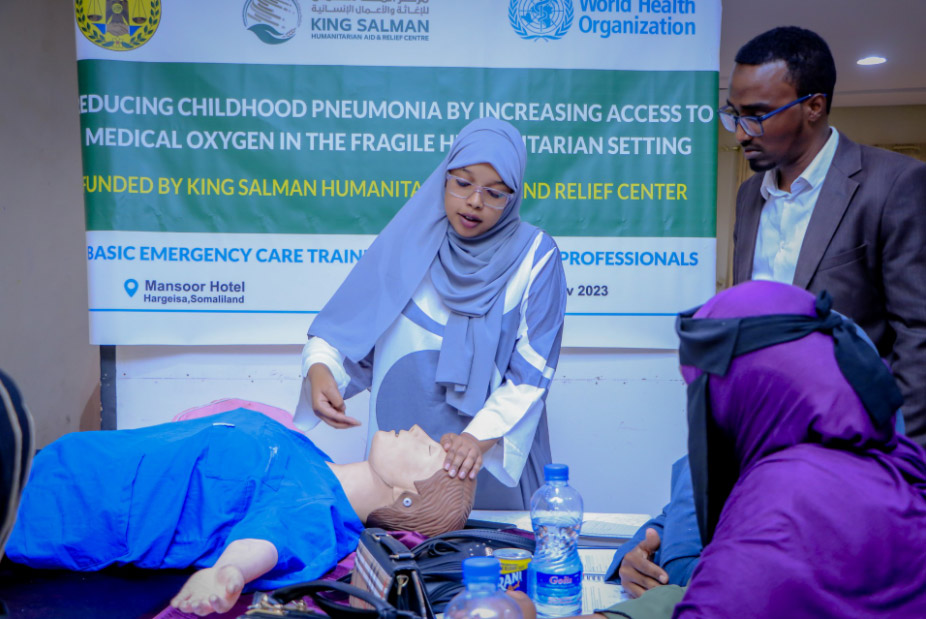 Participants received hands-on training sessions during basic emergency care training in Hargeisa on 5–9 November 2023. Photo credit: WHO Somalia/S. Farah08 December 2023, Hargeisa, Somalia – Nearly half of the deaths and one-third of disabilities in fragile settings like Somalia are estimated to result from conditions that timely emergency care could prevent. To address this critical need, the WHO country office in Somalia with support from the King Salman Humanitarian Aid and Relief Centre (KSrelief), has helped the Ministry of Health Development in Somaliland to train 28 health professionals on basic emergency care (BEC).
Participants received hands-on training sessions during basic emergency care training in Hargeisa on 5–9 November 2023. Photo credit: WHO Somalia/S. Farah08 December 2023, Hargeisa, Somalia – Nearly half of the deaths and one-third of disabilities in fragile settings like Somalia are estimated to result from conditions that timely emergency care could prevent. To address this critical need, the WHO country office in Somalia with support from the King Salman Humanitarian Aid and Relief Centre (KSrelief), has helped the Ministry of Health Development in Somaliland to train 28 health professionals on basic emergency care (BEC).
WHO, in collaboration with its partners and the International Federation for Emergency Medicine, has developed the BEC course for front-line health providers which enables them to manage acute, life-threatening conditions with limited resources. The BEC training on 5–9 November 2023 in Somaliland was attended by 6 doctors, 15 nurses, and 7 midwives from 7 regional health facilities – including 21 women from the Awdal and Gailey regions. The Deputy Minister of Somaliland’s Ministry of Health Development, Honourable Liban Gahnuug inaugurated the event by thanking the KSrelief and WHO for helping the ministry with such an important training. “This initiative will help provide hands-on training to health professionals and help them learn a systematic approach for the initial assessment and management of time-sensitive health conditions, where early intervention saves lives,” added the deputy minister.
The BEC course introduces a systematic approach to managing acute, potentially life-threatening conditions even before a diagnosis is known. It includes modules on airways, breathing, circulation, diaphragm, trauma, shock, burns, altered mental status, and extras (ABCDE assessment). The practical skills section covers the essential time-sensitive interventions for these key acute conditions.
“The course is designed for front-line physicians and nurses and focuses on life-saving interventions for acutely ill patients suffering trauma, difficulty in breathing, shock, and altered mental status,” explained the trainer, Mr Mohamud Salah. The course package includes a participant workbook and electronic slide decks for each module. The course is based on WHO guidance, including for the emergency triage assessment and treatment for children, and the integrated management of adult/adolescent illness.
“Specifically, the BEC-trained health workers are capacitated to minimize further harm to the patients, reduce pain, prevent potential complications, and save lives,” observed Dr. Mohamed Abdi Hergeye, Director-General of the Ministry of Health Development, while presiding over the concluding session of the training.
After completing the training sessions, one of the trainees, Dr Haniya Majur observed that: “Such a course is very relevant to a resource-constrained place like Somalia because today we have managed to learn that health emergencies happen every day, everywhere. They affect adults and children and include injuries and infections, heart attacks and strokes, and acute complications of pregnancy and of chronic disease. While specialized care may never be available at all times in all places, a systematic approach to emergency conditions can save lives.”
One of the nurse participants, Ms Sufiya Wasfi, who has been serving in the field for over 6 years, said: “This is the first time I have attended such a useful training. It has helped me to learn that emergency care providers must respond to undifferentiated patients – those with acute symptoms for which the cause may immediately not be known.”
The course is based on the WHO clinical recommendations set out in its “Integrated Management of Adult/adolescent illness district clinician manual”, “Pocketbook of hospital care for Children”, “Paediatric emergency triage assessment and Treatment” guidelines, and “Integrated Management of pregnancy and childbirth” paper.
For more information, please contact:
Fouzia Bano, Communications Officer
Email:
Saeed Ahmed, Reporting/EXR Officer
Email:
Note to editors:
For more details about WHO’s response across Somalia, see:
https://www.who.int/publications/i/item/9789241510219
1 Names of trainees have been changed for security reasons.


